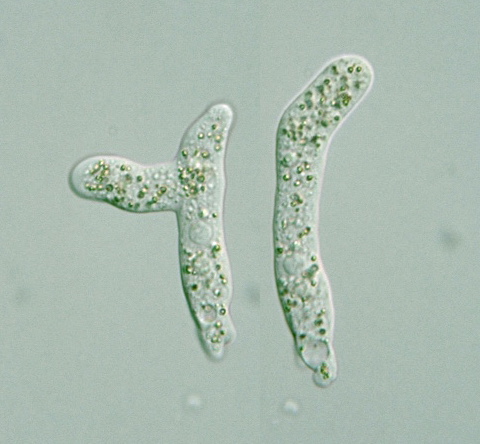
 Trichamoeba sp.
Trichamoeba sp.
 Genus: Usually limax-like, with villous-bulb uroid; locomotion by steady flow with occasional
slight antero-lateral bulging; floating form with long, blunt, granular pseudopodia; uninucleate (Page, 1976).
Pseudopods do not meld at bases during locomotion; pseudopods not ridged; nucleus spherical
(Illustrated Guide, 1985).
Genus: Usually limax-like, with villous-bulb uroid; locomotion by steady flow with occasional
slight antero-lateral bulging; floating form with long, blunt, granular pseudopodia; uninucleate (Page, 1976).
Pseudopods do not meld at bases during locomotion; pseudopods not ridged; nucleus spherical
(Illustrated Guide, 1985).
Species:
|
Trichamoeba sp. ?,
cell body about 100 μm long, 14 μm wide, L/W=,
nucleus about 6 μm in diam.,
x 640, near Oh-hashi (large bridge), Asa-kawa (Asa river), Hachioji city, Tokyo, Japan, March 26, 2005 by Y. Tsukii
 31 μm
31 μm
 63 μm
63 μm
 94 μm; x 640
94 μm; x 640


Trichamoeba villosa Wallich, 1863:
Polypodal, 180-250 μm long;
monopodal, 250-300 μm long. Uroid,
semipermanent, with fine filaments. Ectoplasm, viscous, clear, thin. Endoplasm,
grayish, granular; nucleus, round in flat view, 30-45
μm diam.,
contractile vacuole 40-60 μm
(Illustrated Guide, 1985).
L/B often 3 (?) (Page, 1976).
Trichamoeba miyakka Bovee, 1972:
Broadly clavate in locomotion, 200-300 μm long.
Uroid, a semi-permanent bulb or cup with short lobes. Ectoplasm, clear not distinct from endoplasm. Endoplasm, clear, few granules; nucleus spheroidal, 40-60 μm,
sometimes dented, no endosome (Illustrated Guide, 1985).
Generally thicker than T. villosa, L/B 2.5-3 (?) (Page, 1976).
Trichamoeba osseosaccus Schaeffer, 1926:
100-150 μm long; relatively slender (?),
L/B 2-5; nucleus 13-17 μm (Page, 1976).
Bag-like in locomotion with trailing bulge (uroid and filaments), broader at anterior than at posterior
(How to know the protozoa, 1979).
monopodal 150-180 μm long;
uroid a semipermanent disc wifh fine filaments; nucleus spherical 13-17
μm, no endosome; contractile vacuole 15-20
μm diam. (Illustrated Guide, 1985).
Please click on images for viewing enlarged.
Copyright
Protist Information Server
 Genus: Usually limax-like, with villous-bulb uroid; locomotion by steady flow with occasional
slight antero-lateral bulging; floating form with long, blunt, granular pseudopodia; uninucleate (Page, 1976).
Pseudopods do not meld at bases during locomotion; pseudopods not ridged; nucleus spherical
(Illustrated Guide, 1985).
Genus: Usually limax-like, with villous-bulb uroid; locomotion by steady flow with occasional
slight antero-lateral bulging; floating form with long, blunt, granular pseudopodia; uninucleate (Page, 1976).
Pseudopods do not meld at bases during locomotion; pseudopods not ridged; nucleus spherical
(Illustrated Guide, 1985).

